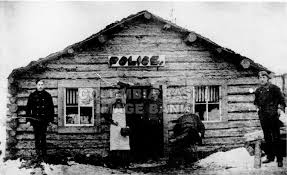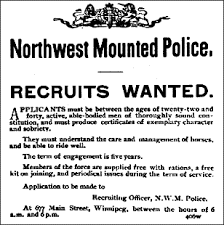PART TWO
What is without question the most remarkable fact about the expeditions of these police explorers of northern Canada is that discoveries of tremendous importance have been made, and yet hardly any mention has been made of them in the newspapers or geographical journals. It is most inconceivable to believe that two new lakes, almost as large as Lake Ontario, and a range of mountains two hundred miles long, could be discovered within a few hundred miles of flourishing cities without creating at least some sort of sensation. Yet this has happened not once, but on several occasions.
In February of 1911 Sergeant MacLeod, of the Royal Mounted, was detailed to undertake a hazardous patrol into the unknown country north-east of Fort Vermillion, an outlaying station on the Peace River, to the North of Athabasca. The result of his weeks of hardship and peril was the discovery of a lake larger than Lesser Slave Lake, over seven thousand square miles in area, a huge inland sea, into which one could put the whole of Wales. The few Indian dwellings on its shores had never before been visited by a white man. From the most authoritative sources the writer is assured that, outside those associated with the reports, not only is MacLeod’s discovery totally unknown, but also the still more important discoveries of Sergeant A.H.L.Mellor and Constable Johnson, in their exploratory patrol of the country south of the Great Slave Lake in the August and September of 1910.

DISCOVERING A SULPHUR WORLD
When the Canadian Government purchased the famous Pablo herd of buffaloes in 1909 they determined to ascertain if any wild herds still existed in the unknown Northlands. This work was done entirely by the men of the Royal Mounted, and Mellor and Johnson were detailed to penetrate deep into the country which was absolutely unknown land, inasmuch as it had never been visited by a white man. All knowledge of what lies to south and east of the Great Slave Lake ceases at the mouth of the Buffalo River, and on the latest Government maps the country for seven hundred miles east and west and two hundred miles north and south is a white blank.
At the mouth of the Buffalo River Mellor and Johnson tried to induce the Indians to accompany them, but the most intrepid of their hunters refused to go. They painted the dangers and hardships of this unknown country in the most appalling terms, saying that nothing lived in it but strange and powerful spirits, that it was a country “burning up” and filled with deadly poisons.
On the eighth of August the two explorers set out up the river alone, and from that moment were regarded as lost by the natives. When they camped at the end of the first day’s journey strange and sickening odours came to them on the winds. The next day the odours became almost unbearable, and by noon their canoe entered the edge of what is probably one of the most remarkable regions on the North American continent.
It was literally a world of sulphur. The swamps, the streams, and the endless “muskegs” reeked with it, and though the country was well timbered and bore berries in profusion, not a sign of wild life could be seen.
Undaunted by their personal discomfort, Mellor and his companion pushed on, and forty-five miles from the mouth of the Buffalo came upon a very large tributary flowing into the main stream from the south. In places this stream was a mile in width, and it ended in a lake which opened up like a great sea across which they could not see. After days of exploration the two men judged the lake to be from thirty to forty miles in width and from eighty to a hundred in length. On a particularly clear day Mellor and Johnson were looking to the south and west from a height of land when they very distinctly made out a range of mountains running almost to the southermost shore of the lake. Penetrating towards these mountains they came upon a number of natives who lived far to the south, and who were prospecting for game close up to the “ Burning Lands.”
TBC
